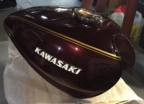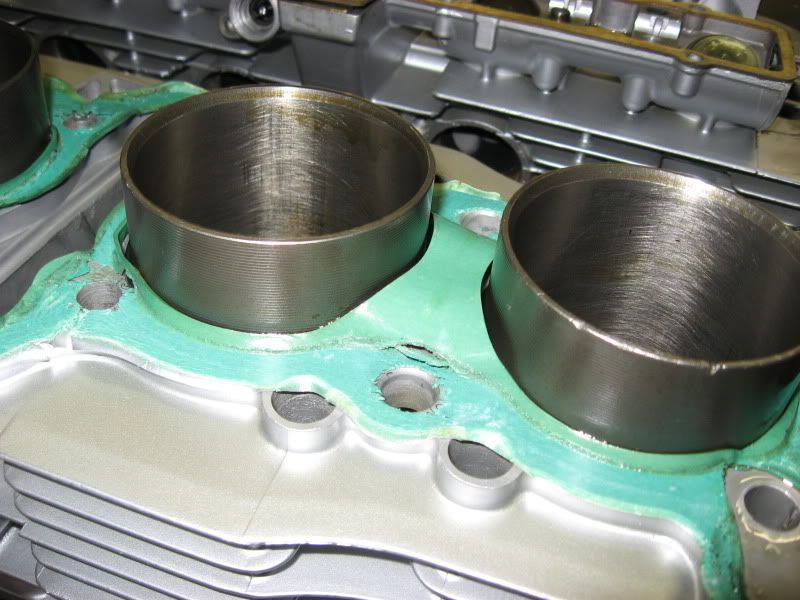GPZ 750 heat flatness
- missionkz
-

- Offline
- Sustaining Member
- Posts: 1622
- Thanks: 184
Re: GPZ 750 heat flatness
05 Jul 2016 12:02No not the valve guides.... the valve guide seals. The little bonnets on top of the guides in the valve spring's bores.Poudrette wrote: I did a test on the valve seats before valve disassembly, (again from youtube video haha) filling the space above with gasoline and seeing if it woul leak through in the combustion chamber between valve and valve seat. After a good while, I did not see a single drop on any of 4 exhaust or 4 inlet valves. Wondering if this is considered a good approach by all here to decide if the seat is good, at least before disassembly. I did check for compression before disassembly with the sponnful of oil in the cylinder and tht why «i decided to change the rings and assume the valves are at least mostly ok. If I understand your feedback properly, you are suggesting to change valve guides to avoi oil going into the combustion chmber when valve open up ? .......
Sylvain
If you have a valve spring compressor, it is a very simple matter to lap in or clean up the valve seats and valve head mating surfaces without having to have a shop regrind the seats and all that.
Just went through this myself.
The valves will be out and you can lap those valves in and maybe get a bunch more time on the head before a valve job is needed.
If there is no leakage now, I would still change the bonnets anyhow. It's really cheap insurance.
WEAR SAFETY GLASSES WHEN DOING ANY OF THIS!!
Another way to test the valve to valve seat seal is to partially fill the ports with a very very thin liquid, like carb cleaner... etc.
Then take your vacuum cleaner with the hose hooked up backwards so it blows air and put the hose into the intake or exhaust port. That will put a little pressure in the port and force the liquid out if there is a leak.
The pressure in the intake runner/port is never more then atmospheric air pressure of under 15psi in a normally aspirated engine.
Exhaust is higher of course but you can still test it.
It has been my experience that leaky valves are usually the exhaust ones but mostly it's caused by improper adjustment of valve lash, rocker, cam or shim clearances.... etc.
Bruce
1977 KZ1000A1
2016 Triumph T120 Bonneville
Far North East Metro Denver Colorado
1977 KZ1000A1
2016 Triumph T120 Bonneville
Far North East Metro Denver Colorado
The following user(s) said Thank You: Poudrette
Please Log in or Create an account to join the conversation.
- Poudrette
-
Topic Author
- Offline
- User
- Posts: 6
- Thanks: 0
Re: GPZ 750 heat flatness
20 Jul 2016 20:47
Hi OK I ve found what this is, and the spare ones brand new were actually included with the engine gasket kit I bought (see pic). Silly question: should I pull out the old ones with noze pliers I can t get them out easy. I tried a light squeeze on one with the longnose and was not cooperating. Dont want to damage anything I am not seeing under the old seal,
Attachments:
Please Log in or Create an account to join the conversation.
- SWest
-

- Offline
- Sustaining Member
- 10 22 2014
- Posts: 23331
- Thanks: 2875
Re: GPZ 750 heat flatness
20 Jul 2016 20:54
You can make a J pick out of coat hanger. Make it sharp enough to get under the lip of the seal and pull up.
Steve
Steve
Z1b1000 1975 Z1b
kzrider.com/forum/11-projects/598262-kz-...-will-it-live#672882
kzrider.com/forum/2-engine/597654-poser?start=240#704229
kzrider.com/forum/11-projects/598262-kz-...-will-it-live#672882
kzrider.com/forum/2-engine/597654-poser?start=240#704229
Please Log in or Create an account to join the conversation.
- Nessism
-
- Offline
- Sustaining Member
- Posts: 7664
- Thanks: 3034
Re: GPZ 750 heat flatness
20 Jul 2016 21:57
Ed
Carb O-ring Kits : www.kzrider.com/forum/3-carburetor/61807...-o-ring-kits?start=0
www.kzrider.com/forum/faq-wiki/618026-new-owner-things-to-know
1981 KZ750E2
www.kzrider.com/forum/11-projects/604901...z750e-project-thread
Carb O-ring Kits : www.kzrider.com/forum/3-carburetor/61807...-o-ring-kits?start=0
www.kzrider.com/forum/faq-wiki/618026-new-owner-things-to-know
1981 KZ750E2
www.kzrider.com/forum/11-projects/604901...z750e-project-thread
Please Log in or Create an account to join the conversation.
- Poudrette
-
Topic Author
- Offline
- User
- Posts: 6
- Thanks: 0
Re: GPZ 750 heat flatness
23 Jul 2016 07:43
"Evil green gaskets" OK thanks presumably the black one for the head with the metal inserts would be OK I hope, I paid 70 bucks for the kit and they are hard to find altogether. The green one in my kit and the green one that looks like hell after service on your pictures is the cylinder to crankcase gasket, I still have the old one and it s all metallic, maybe I can reuse it after checking for nicks and stuff. Not sure altogether.
:woohoo:
:woohoo:
Please Log in or Create an account to join the conversation.


